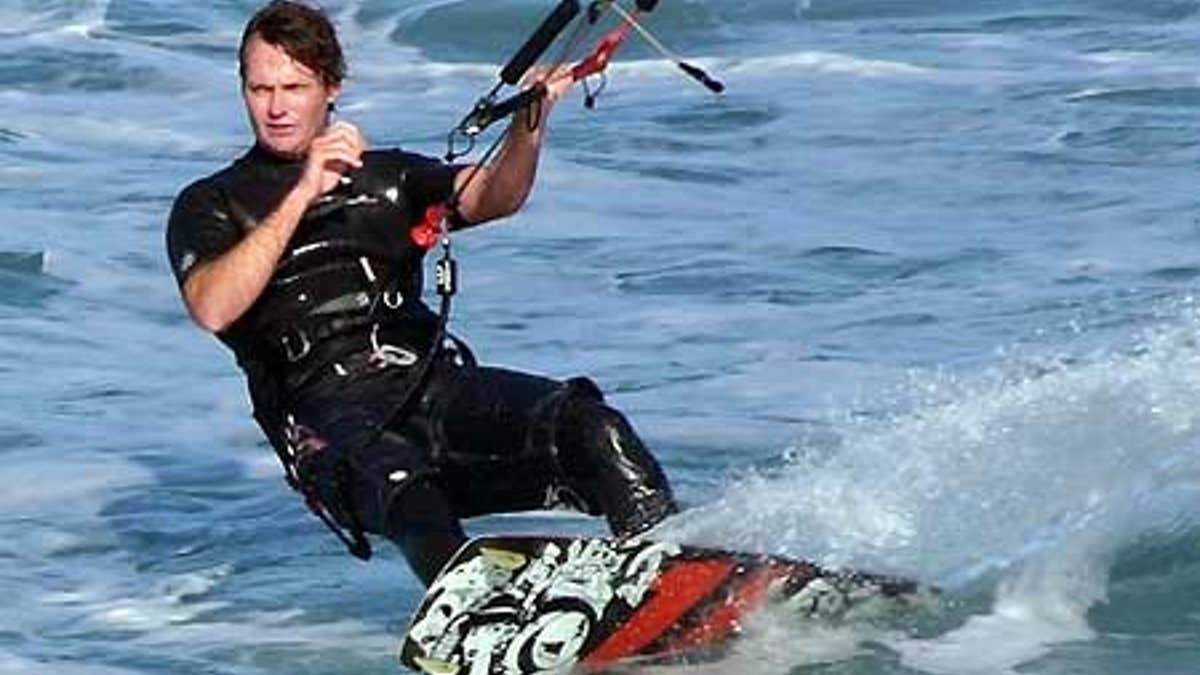
Stephen Schafer kitesurfing in 2007. (Chris Shultz)
STUART, Fla. – A lifeguard who rescued the victim of a shark attack off Florida's Atlantic coast said Thursday he could see several sharks breaking the surface and blood in the water as he approached in rough surf.
The 38-year-old victim, Stephen Howard Schafer, died in a hospital soon after being pulled to shore, marking the first fatal shark attack in Florida in five years.
Lifeguard Daniel Lund, 47, said he first spotted Schafer from his tower on the beach Wednesday afternoon and he could tell the kiteboarder was in trouble. He said Schafer was lying on the large sail he was using to pull himself across the water.
Lund grabbed his long surfboard and paddled 20 minutes through rough seas, fighting 4- to 6-feet-high waves, to reach Schafer about a quarter-mile offshore.
"I get to him, I'm probably within 20 yards or so from him, and there's just a lot of blood in the water," Lund said.
He could see several sharks circling nearby. He pulled the injured Schafer onto his board and began paddling back. Lund declined to describe Schafer's injuries, but said he was conscious and speaking when they got to the beach and paramedics began treating him.
Authorities are investigating what types of sharks were involved and whether multiple sharks bit Schafer. Beaches remained open Thursday.
Shark attacks, especially fatal ones, are extremely rare, said George Burgess, a leading shark expert who directs the International Shark Attack File at the University of Florida's Museum of Natural History. The file lists 1,032 attacks in the U.S. documented since 1690. Only 50 of them were fatal.
"Internationally, we've been averaging four fatalities per year, despite the fact that there are billions and billions of human hours spent in the sea every year," Burgess said Thursday. "Your chances of dying in the mouth of a shark are close to infinitesimal."
Friends said Schafer always followed the buddy system while surfing and were surprised he was in the water alone.
"We always know that (sharks) are out there. You see them this time of the year," said Teague Taylor, a childhood friend who says Schafer taught him to surf. "It's hard to believed that such an experienced waterman would make that one mistake."
Schafer, a gifted artist and graphic designer, was drawn to the water as a child. He surfed competitively and later started sailing, windsurfing and kiteboarding. Kiteboarders surf across the water on boards strapped to their feet, using large curved sails to pull them along.
"He had to be around the water," said Taylor, who manages a local surf shop.
The last fatal shark attack in the state was in 2005 off the Florida Panhandle, where a 14-year-old Louisiana girl was attacked while swimming on a body board about 100 yards off shore.
"Florida as a geographic entity has more than any other place in the world," Burgess said, noting that most attacks are minor, "the equivalent of a dog bite."
However, Burgess noted that this time of year there are typically fewer shark attacks in Florida because temperatures are cooler and not as many people are in the water.
He said sharks are lining "up in South Florida getting ready to move north" as temperatures begin to warm.
"The sharks gradually move their way northward and disperse," Burgess said. "The message to take home is this is a rare and unusual event. It should put the antennae up for people, in terms of, 'Yeah, we need to be careful when we enter the sea, but we need to do that every time because we're never guaranteed safety 100 percent of the time when we enter a wild world."'
